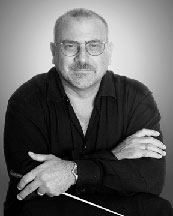by Daniel Hathaway
Martin Kessler
An anonymous member of Pennsylvania’s Susquehanna Valley Chorale made a donation in 2007 toward commissioning a piece dealing with Alzheimer’s disease in honor of his parents, who had both died of that irreversible neurological condition. A blog was set up in cooperation with Garfein (the librettist for Elmer Gantry and Rosenkranz and Guildenstern are Dead) to collect stories from chorus and community members who had dealt with the disease. The work was premiered in October, 2009 at the Weis Center at Bucknell University in Lewisburg, Pennsylvania, along with works by Cohen’s teacher, Ron Nelson, and was recorded for radio and television by PBS. (Read the libretto and listen to excerpts here).
“Alzheimer’s Stories was brought to me by Marian Patterson, a cellist in the Suburban Symphony who is a retired member of the neurological faculty at UH”, Kessler told us in a telephone conversation. “It was brought to her by Peter Whitehouse, who had seen the premiere and was very taken with it musically. He’s a neurologist who is very interested in the crossover between music and medicine, and both expressed an interest in having me conduct the Cleveland premiere.”
That would seem a natural for the Suburban Symphony, whose members include many medical professionals, but the orchestration of Alzheimer’s Stories didn’t quite fit. “It’s strangely but beautifully scored for brass sextet, solo violin, solo cello, solo clarinet and five percussionists, including piano,” Kessler noted, but because the work was so gripping, he was determined to find the right circumstances to perform it. “I fell in love with it. The style is a really attractive milkshake of American influences: Barber, Sondheim, a little bit of John Adams. It’s a very charismatic piece in part because Cohen’s taste keeps it from being too maudlin or sentimental, but rather it speaks to a deeper emotion about the issues raised in the three movements.”
Kessler’s thoughts led him to Severance Hall where he felt he could create a Suburban Symphony concert centering around the Cohen work. “The venue is important because the piece needs space for a large chorus and two soloists with an operatic style of drama in their voices. The challenge was to build a whole concert around a piece that’s half an hour long”. Kessler’s next inspiration was Ravel, “who died from a mysterious form of dementia that has been poshumously diagnosed as a form of Alzheimer’s. His last major work was the Concerto for the Left Hand, which also had a theraputic dimension because it was written for Paul Wittgenstein, who had lost a hand in the war. That provided a full orchestral possibility”.
For a soloist Kessler turned to pianist Emanuela Friscioni, who had played the Ravel half a dozen years ago with Suburban and who agreed to repeat it again on November 18. “Then I wanted to add a brief choral work,” Kessler noted, “and I thought of Beethoven’s Choral Fantasy. I was bold enough to approach Antonio Pompa-Baldi, Friscioni’s husband, but it happened that he would be on tour in the Caribbean on the date we had originally chosen for the concert. Then we had to change the date to November 18 and Antonio graciously agreed to play, donating most of his usual salary to the benefit.”
The vocal forces for the afternoon include Kessler’s Choral Arts Society and the glee clubs of Laurel and University Schools, as well as soloists Ted Christopher, baritone, and mezzo soprano Bonnie Cutsforth-Huber. Christopher, a perennnial favorite at Ohio Light Opera, was a former student of Kessler’s at University School (from whose faculty Kessler recently retired), and Cutsforth-Huber sang at the premiere of Alzheimer’s Stories. “Bonnie teaches at Penn State Altoona and I wanted to use her again because I loved the tonality of her voice, which can project age as well as other colors. And Ted, who teaches at Penn State in State College, is very dramatically comfortable in a Sondheim setting.” Scheduling issues once again worked in Kessler’s favor. “Ted originally turned us down because he was leaving to do master classes in Japan, but he changed his travel plans and will be flying there from Cleveland soon after the concert”.
All these favorable confluences augur well for the success of the November 18 concert. “I’m thrilled about the project”, Kessler told us before going off for a busy day that included a conference call with University Hospitals, an interview with WCPN’s Dee Perry and a Severance Hall walkthrough, “to the point where I’ve become rather obsessive about it. I lie in bed at night with phrases of the Cohen piece running through my head.”
Published on ClevelandClassical.com November 13, 2012
Click here for a printable version of this article.


